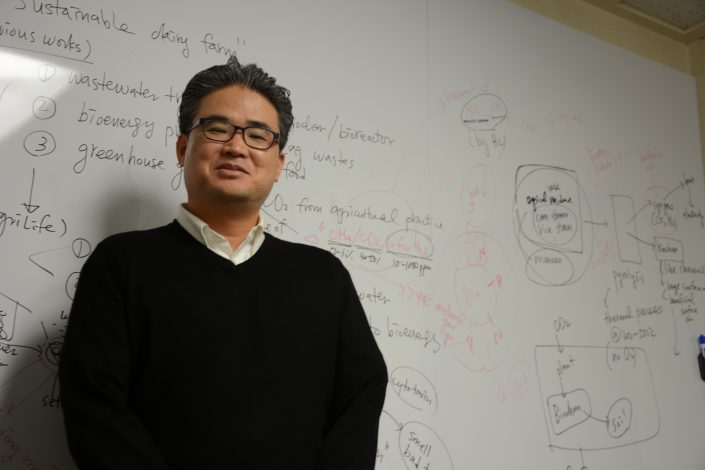Closed-loop dairies could be future of sustainable farming, researcher says

Image: Texas A&M AgriLife
Eunsung Kan sees his concept of a closed-loop dairy farm, which reuses wastewater, emits zero waste and powers itself on manure, as the future of sustainable animal farming.
Kan, a Texas A&M AgriLife Research chemical and environmental engineer in Stephenville, said his concept could change the way dairies, swine and poultry farms deal with manure, wastewater and greenhouse gasses while utilizing the waste to generate electricity.
Animal waste is a blessing and curse for dairies.
Manure is sold to local farmers who need to infuse nutrients into the soil for crops and forage. However, tons of manure can also be logistically taxing as facilities keep up with the treatment and distribution of large quantities of environmentally problematic materials monitored by state and federal environmental regulators.
Farm operations have been implicated in higher-than-normal levels of nitrogen and phosphorous, antibiotics, heavy metals and hormones in surface and groundwater downstream from facilities. Manure is also a known contributor to greenhouse gas emissions, such as methane and carbon dioxide.
The U.S. Department of Agriculture Natural Resources Conservation Service estimates manure from a dairy milking 200 cows can produce as much nitrogen as is in the sewage from a community of 5,000-10,000 people.
Kan’s research would utilize existing technology – biochar, a carbon material similar to charcoal, created from animal manure and agricultural waste, such as corn stubble or rice straw – that would be used to filter solid waste and effluent. The biochar could be used as a slow-release fertilizer or converted, via pyrolysis, which is the decomposition of organic material by heat, into energy to power the farm.
The closed-loop dairy concept focuses on three main goals – wastewater treatment using dairy manure-derived biochar, producing bioenergy using dairy manure and capturing greenhouse gasses via adsorption onto dairy manure-derived biochar, Kan said.
Biochar has proven to provide a beneficial surface chemistry that can filter a wide range of contaminants, including nitrogen and phosphorous, he said. When the surface of biochar is modified with several methods in a lab, it has shown an ability to capture antibiotics, pesticides, hormones, heavy metals and other possible contaminants.
“The mission is the treatment and reuse of dairy wastewater and the conversion of dairy waste into energy to power the facility,” he said. “It focuses on providing a model for sustainable farming.”
Last year, Kan received a $1 million grant from the Texas A&M University Chancellor’s Research Initiative Fund to research the viability of the closed-loop dairy system. Before joining AgriLife Research, he also received about $400,000 in research grants from the Environmental Protection Agency, U.S. Department of Agriculture and U.S. Geologic Survey to research the concept’s potential to treat animal waste, control greenhouse gas emissions and convert manure to energy.

